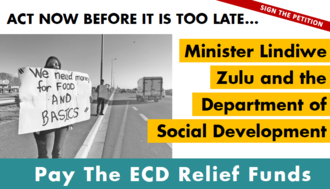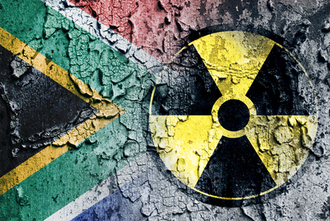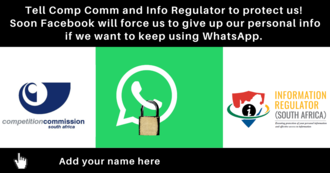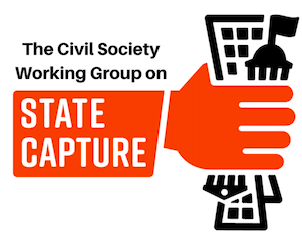- Featured
- Clean air
- Climate justice
- Consumer Rights
- Corporate Accountability
- Data access
- Early Childhood Development
- Economic fairness
- Education
- Electoral fairness
- Environmental justice
- Food justice
- Gender based violence
- Grants/social assistance
- Health
- Housing and infrastructure
- Industry interference
- Land Justice
- LGBTQIA+ rights
- Media/ information access
- Public transport
- Racism
- Reparations
- Safety
- Sanitation
- Service Delivery
- Sexual and Reproductive Rights
- Social justice
- Unemployment
- Womxn's rights/ gender equality
- Workers' rights
- More
-
Stand with farm women who demand a wealth taxIf there was ever a time in South Africa’s history to impose a wealth tax, it is now. Here’s why: 1. In 2021 the South African Revenue Service appointed the first Director of the High Wealth Individuals Unit, tasked with improving the tax compliance of wealthy individuals and assessing the feasibility of a wealth tax. There is also existing research showing the viability of a wealth tax [1] Argentina successfully implemented a once-off wealth tax generating $2.4 billion in 2021 for COVID-19 relief [2]. 2. Internationally, a group of millionaires and billionaires - Patriotic Millionaires, Millionaires for Humanity and Tax me Now - have called for a permanent wealth tax on the richest citizens in every country (2022) [3]. The world is moving in this direction. Sign the petition to help secure a wealth tax in South Africa NOW! https://youtu.be/9UNUchUQUbo [1] A wealth tax for South Africa, Aroop Chatterjee, Leo Czajka and Amory Gethin for Wits University, January 2021. [2] Critics say a wealth tax wouldn't work. Argentina just brought in $2.4 billion with one, Juliana Kaplan for Business Insider, 4 May 2021 [3] 102 millionaires, including Abigail Disney, have signed another letter asking governments around the world to raise their taxes, Huileng Tan for Business Insider, 19 January 2021.4,489 of 5,000 Signatures
-
Pay The ECD Relief Funds Now!The delays in payment have resulted in hundreds of ECD centres buckling under the strain of Covid-19 and closing down as they cannot afford rent, electricity, nutrition for the children in their care, or staff salaries. Many staff members have had little to no income for almost two years, since the initial nation-wide lockdown in March 2020, and are struggling to put food on their tables and pay for basic needs – they truly require emergency relief funding.1,654 of 2,000 SignaturesCreated by Michaela Ashley-Cooper
-
Help stop convicted woman abuser Koffi Olomide concert in Nairobi, KenyaKoffi Olomide has a documented history of violence directed at women. In March 2019 he was convicted of statutory rape in France and between 2002 and 2006, sexually assaulted his dancers [2]. In July 2016, he was deported from Kenya for assaulting one of his dancers [3]. Allowing him to perform in Kenya right after the 16 Days of Activism to End Violence Against Women and Girls global campaign, right after Human Rights Day, and right before Jamhuri Day would undermine the victims of his actions and derail all the progress our country has made in the fight against GBV. Neither of these scenarios must be allowed nor tolerated, as Kenya already has a GBV crisis and must not reward perpetrators with platforms such as this. It is all our moral responsibility to ensure Kenya does not become a magnet for foreign criminal elements, especially those that violate the human rights of women and girls. [1] https://www.kenya24news.com/lifestyle/koffi-olomide-set-for-nairobi-concert/203042-news [2] https://www.bbc.com/news/world-africa-47615273 [3] https://africa.cgtn.com/2016/07/23/koffi-olomide-deported-by-kenya-after-he-assaulted-one-of-his-dancers/253 of 300 SignaturesCreated by Stop Koffi Olomide Collective KE
-
Tell Minister Godongwana to increase the Sugary Drinks Tax to 20%Greedy companies want to stop the sugary drinks tax to protect their profits. Many of these same companies have a history of dishonesty which it comes to the economic impact of a tax on sugary drinks. The sugar industry has exaggerated their statistics when it comes to the claims they make about the Sugary Drinks Tax causing job losses when research from Trade and Industry Policy Strategies finds otherwise [1]. It’s clear that increasing the Sugary Drinks Tax to 20% could help improve our people's health. We have an opportunity to help achieve this goal. On the 11th of November, Finance Minister, Enoch Godongwana will be delivering the 2021 Medium-Term Budget Policy Statement. If enough of us come together, we can remind the Minister that he has the public support necessary to increase the Sugary Drinks Tax. [1] SA’s proposed sugar tax: claims about calories & job losses checked: https://africacheck.org/fact-checks/reports/sas-proposed-sugar-tax-claims-about-calories-job-losses-checked50 of 100 SignaturesCreated by Palesa Ramolefo

-
Pres. Ramaphosa must use presidential pardon to #FreeMartha now!Martha Libuseng Marumo is a survivor of domestic violence. She spent many years of her marriage trying to keep herself safe from her sexually and physically abusive husband. After years of trying to get help from the police to escape this violence, Martha was told by them that they could not help her because “it is a family matter” [1]. In the end, after many attempts to free herself she took the law into her own hands and killed her husband. In 2005 she was given a life sentence for killing her husband in defense of herself and her children. She recently shared details of her story at the National Gender-based Violence (GBV) summit on how her husband would beat her, force himself on to her, and take away her agency as a woman. Martha’s story isn’t unique but is one of many tragic examples of how the justice system fails women, and other survivors of gender-based violence. Everyday women interact with this unjust system when they try to escape violent and abusive situations. Enough is enough! A recent police report also showed that 59% of South Africans feel dissatisfied with the courts [2]. Our country needs to fix this system that stigmatises survivors and lets perpetrators walk free. It’s time that the judicial system chooses a side: does it care about survivors or does it protect perpetrators?1,051 of 2,000 SignaturesCreated by Yolanda Dyantyi
-
Victory: YOU Magazine must cancel their Nestle event. Put child nutrition first.The majority of mothers and guardians in Mzansi are unable to afford nutritious food for their babies and children, let alone put food on the table [1]. On top of this, mothers and guardians are constantly bombarded by marketing by food companies to sell their ultra-processed products which are packed full of sugar. Food companies like Nestle have undermined breastfeeding promotion in the past, so the Department of Health put in place regulations to limit how companies advertise and promote their products. These regulations were put in place to help protect mothers, guardians, babies and children from these companies. But Nestle’s latest marketing campaign violates these regulations meant to safeguard the nutrition and health of Mzansi’s children, at a time when three million children have been affected by hunger in recent months [2]. This is unacceptable. If we are going to start changing this situation, we must challenge companies who put their profits before people's health. [1] Household affordability index, Pietermaritzburg Economic Justice & Dignity Group, 28 July 2021 [2] Food crisis: 2.5 million South Africans experience hunger ‘every day’, By Nic Spaull and Mark Tomlinson for Daily Maverick, 26 May 2021312 of 400 SignaturesCreated by amandla .mobi member

-
Say No to Nuclear Plans in Thyspunt by 31 July 2021South Africans have until 31 July to say no to a Nuclear Installation Site Licence (NISL) application. Late last year we objected to the building of a new nuclear plant at Duynefontein near the existing Koeberg Nuclear Power Plant. Now Eskom has applied for yet another new site license for Thyspunt, located in the Eastern Cape, to the National Nuclear Regulator (NNR) Board. South Africa cannot afford and doesn't need [1] unsafe [2] and unnecessary nuclear power. Object to Eskom’s plans before it’s too late. Nuclear power is dangerous, unhealthy and costly. Nuclear plants – big or small – are very expensive to set up, often with cost overruns and construction delays. The cost of the decommissioning of these plants is also prohibitively costly. As history has taught us, new nuclear procurement is where large scale corruption can, and has, taken place. In this instance, little to no information has been provided to the public on the cost and feasibility of new nuclear energy. Transparency is needed to build back public trust after past illegal and unconstitutional nuclear deals. Nuclear power is not needed for our energy grid now or in the future. Especially during the Covid-19 crisis, we should not be looking at procurement of one of the most expensive forms of energy. The most recent Energy plan, IRP 2019, does not show the necessity for the procurement of nuclear energy. Also no-one can guarantee 100% safety with nuclear energy. Radiation and radioactive waste created at nuclear power stations are extremely toxic. More nuclear power could put the health of workers – most-likely younger people – and communities close to the plants at risk. Consider what Electrical Engineer Hilton Trollip points out, “We absolutely do not need Koeberg to avoid load shedding. There are documented and proven sustainable electric systems that can run very well without nuclear and even without coal.” We should instead move toward a just energy transition, investing in and supporting renewable energy sources. Not only is RE able to create a more inclusive energy landscape – giving formerly-excluded communities more of a chance to be part of the economy – the risks associated with RE are significantly less. References: https://ewn.co.za/2017/04/26/western-cape-high-court-rules-sa-nuclear-deal-unlawful-and-unconstitutional https://theconversation.com/why-decommissioning-south-africas-koeberg-nuclear-plant-wont-be-easy-89888#:~:text=The%20potential%20cost%20of%20decommissioning,UK%20model%20at%20R76%20billion https://www.iol.co.za/news/south-africa/western-cape/safety-concerns-over-koeberg-nuclear-plant-as-cape-town-tremors-grow-in-intensity-74d7b088-2840-41ee-a8a7-a40fa83451ee1,371 of 2,000 SignaturesCreated by SAFCEI

-
Stand with the families of Life EsidimeniDespite promises of a monument, and government officials vowing to apologise to each individual grieving family, government has done nothing. We, in support of the bereaved family members, demand accountability for the violations of human rights of mental healthcare users in the province and call on government to admit its wrongdoings publicly through the construction of the “Living Monument” and the five focused facilities to be attached to existing clinics in all five regions in Gauteng, as envisaged by the Life Esidimeni Family Committee. A formal inquest into the deaths due to the Gauteng Mental Health Marathon Project will begin in Pretoria on 19 July 2021. A Judge will assess evidence surrounding each of the mental healthcare users’ deaths and make recommendations about potential criminal liability on the part of government officials and NGO owners. While we want those responsible for this atrocity to be put in jail, we acknowledge that mental healthcare users in the province remain vulnerable and under-supported due to an uncaring government that has failed to prioritise their needs. This issue needs more visibility, as society’s treatment of people with mental illness is currently characterised by stigma and silence, which make life harder for mental healthcare users and their loved ones. A monument will contribute to efforts to combat stigma against mental healthcare users. We cannot turn a blind eye to the needs of some of the most vulnerable groups of people in our society. They are our mothers and fathers, sons and daughters, brothers and sisters. We need a memorial to ensure this never happens again, and so that the memories of the lives lost in the Life Esidimeni tragedy is never forgotten. Never again can such a tragedy occur in our land.246 of 300 SignaturesCreated by SECTION27 Life Esidimeni Family Committee and SADAG

-
Tell these rich countries + companies to put people before profit by pausing patentsIn Mzansi, as infections rise again, it is now clear that we won’t reach our goal of vaccinating 41 million people by the end of 2021 [2]. We are behind schedule with vaccinations, not only because of issues with the roll-out, but because the world is not manufacturing vaccines fast enough, and rich countries are at the front of the queue. It didn’t have to be this way. Earlier in the year over 100 countries supported temporarily waiving patents on COVID-19 medical tools and technologies [3]. But rich countries, like the United Kingdom which has vaccinated half of its adults with two vaccine doses [4], sided with pharmaceutical companies by putting profits before people. The tide is shifting. After a lot of public pressure, President Biden of the United States has come out in support of the COVID-19 vaccine patent waiver on World Trade Organisations rules [5]. Spain and Italy also support the waiver on COVID-19 vaccine patents [6] [7]. [1] TRIPS Council regular meetings: https://www.wto.org/english/tratop_e/trips_e/intel6_e.htm [2] SA is not reaching herd immunity. Our new goal is containment – here’s how it works: https://bhekisisa.org/resources/2021-06-03-sa-is-not-reaching-herd-immunity-our-new-goal-is-containment-heres-how-it-works/ [3] Countries obstructing COVID-19 patent waiver must allow negotiations to start: https://www.msf.org/countries-obstructing-covid-19-patent-waiver-must-allow-negotiations [4] Over half of UK adults vaccinated with the second dose: https://www.gov.uk/government/news/over-half-of-uk-adults-vaccinated-with-second-dose [5] ] U.S. reverses stance, backs giving poorer countries access to COVID vaccine patents. Reuters. 6 May 2021. [6] Spain backs vaccine patent waiver, calls for more international cooperation. Reuters. 7 May 2021. [7] EU ‘ready to discuss’ COVID vaccine patent waiver, says von der Leyen. Aasra Bramdeo for SABC News. 6 May 2021.738 of 800 SignaturesCreated by Palesa Ramolefo

-
The CCMA must open and stop failing workers #OPENCCMACAMPAIGNRight now, workers are more vulnerable than ever. The COVID-19 pandemic has resulted in job losses, rising cost of living and workers who have been unfairly dismissed and treated need the services of the CCMA to help them get justice. The CCMA must be functioning well so that workers can depend on the institution to fight labour issues. But the CCMA has closed its doors on vulnerable workers and expects workers to refer their case online, which is inaccessible to those who need the most support. The Casual Workers Advice Office (CWAO) has reported that the CCMA is outsourcing things like printing forms to internet cafes around their offices, where there have been incidents of people being charged R40 to refer their case [2]. This is a service the CCMA is supposed to provide for free [3]. The #OpenCCMACampaign is an initiative of 40 organisations. Our aim is to fight to transform the CCMA into an organisation that respects workers and is guided by social justice. The #OpenCCMACampaign will embark on a series of planned actions to challenge planned budget cuts to the CCMA, among other demands. Various actions have taken place throughout the year. We have protested at various CCMA offices [4] and will continue to do so. The CCMA has also threatened the CWAO with legal action for exposing these dodgy operations. We take this action against our partner organisation seriously. But this will not stop us from challenging budget cuts to the CCMA and their own anti-worker actions. Many workers depend on the CCMA to leave the institution’s future in the hands of the bosses and the leaders of the NEDLAC federations. On 30 March, a CCMA statement noted that although R90.1 million has already been deducted from its 2020/21 budget, the projected cuts over three years have been reduced from over R600 million to R301 million. It also confirmed that part-time commissioners would begin to hear cases again, starting from 1 April. None of these changes addresses our core demands for an immediate reversal of the budget cut; for a significant expansion of the CCMA budget; for the full-reopening of the CCMA’s walk-in facilities; for the permanent employment of all part-time commissioners, and for a total transformation of the culture and practices of the institution which have become explicitly anti-worker. We note that the crisis engulfing the CCMA will not be resolved through ‘stakeholder’ meetings and press briefings. We call on all progressive worker organisations to abandon the politics that drives them to look for a ‘seat at the negotiating table’ instead of joining forces with other worker organisations on the ground. [1] http://www.labour.gov.za/employment-and-labour-welcomes-siu-probe [2] https://twitter.com/CWAO_ZA/status/1369599779781611523?s=20 [3] Workers pay for CCMA services that were once free, Masego Mafata and Liezl Human for GroundUp, April 2021 [4] https://twitter.com/CcmaOpen/status/1374674101915283457?s=20173 of 200 SignaturesCreated by #OpenCCMACampaign
-
Stop Facebook forcing us to give up our personal info to use WhatsAppWhen Facebook acquired WhatsApp in 2014, their CEO Mark Zuckerberg said: “We are absolutely not going to change plans around WhatsApp and the way it uses user data. WhatsApp is going to operate completely autonomously.” Facebook CEO Mark Zuckerberg lied. They went ahead and updated WhatsApp’s terms and conditions in 2016, Facebook gave itself access to a wide range of our personal data without our permission. Now, we only have until 15th May until Whatsapp goes back on their word and forces users to opt-in to their terms and conditions. This cannot be allowed. The South African law protects us as users and places emphasis on our protection against companies and corporates that infringe on our privacy laws. “The POPI Act broadly requires businesses to limit their use of personal data, get consent before using it, and let users withdraw their consent later on [1].” Whatsapp completely disregards this act and leaves users with no form of consent before or after signing into the terms and conditions. Mzansi recently introduced new laws to protect people's personal information. “The POPI Act broadly requires businesses to limit their use of personal data, get consent before using it, and let users withdraw their consent later on [1].” Many aspects of POPI are similar to European General Data Protection Regulation (GDPR) which has helped protect people in Europe from companies using their personal information without their consent. Billions of people around the world use Facebook services - Facebook, WhatsApp, and Instagram - in order to connect with friends and family. WhatsApp is the main company world wide with over 2 billion users. This gives Facebook the power to coerce people to share their personal information so they can profit even more than they have. [1] South Africa's POPI Act: https://www.freeprivacypolicy.com/blog/popi/#:~:text=The%20POPI%20Act%20broadly%20requires,done%20in%20a%20Privacy%20Policy.407 of 500 SignaturesCreated by Palesa Ramolefo

-
#ThePeopleSay #WakeUpSA: Raising our voices against state capture and corruptionWe have elected leaders and bestowed on them the responsibility to govern, to enable us to achieve a better life for all – not themselves. We, as people of South Africa, have a right to know in whose interests’ decisions – supposedly in "our” name – were and continue to be made. The culture of secrecy and impunity must come to an end if our democracy is to thrive. Transparency and accountability are non-negotiable, as too are the requirements for transformative actions to address the injustices that remain embedded in our social, economic and political systems. Our constitution is revolutionary in its design, but the values and vision that it prescribes can only materialise if embraced by the state through which it is enacted. As people of this country, we all support the value and vision in the Constitution which protects the rights of the people in our country, it is the bedrock of our democracy and foundation of the rule of law. We, the undersigned, support/endorse this open letter to raise our voices in solidarity against state capture and impunity, and to say now is the time for us to be heard. The realities of the current moment cannot be met with silence and complacency. #ThePeopleSay #Wake-Up SA! Civil Society endorsements: Alternative Information and Development Centre (AIDC) Centre for Applied Legal Studies (CALS) Council for the Advancement of the South African Constitution (CASAC) Corruption Watch (CW) Dullah Omar Institute (DOI) Equal Education (EE) Freedom Under Law (FUL) Legal Resources Centre (LRC) My Vote Counts (MVC) Open Secrets Organisation for Undoing Tax Abuse (OUTA) Public Affairs Research Institute (PARI) Section27 (S27) Southern African Faith Communities’ Environment Institute (SAFCEI) Right2Know (R2K)78 of 100 SignaturesCreated by Civil Society Working Group on State Capture (CSWG)

.png)






.jpg)



.png)
